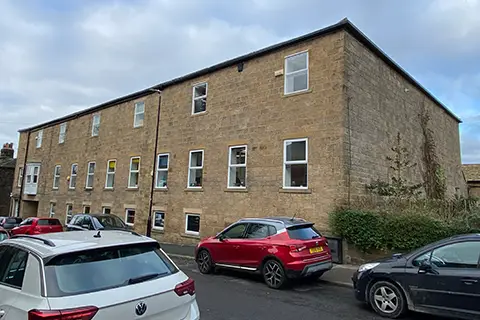Display Energy Certificates (DECs)
Public authority buildings are required to have a Display Energy Certificate (DEC) to raise public awareness of energy use. Discuss your projectDisplay Energy Certificates (DECs) |
Display Energy Certificates (DECs)
Public authority buildings which are accessible to the general public, are required to have a Display Energy Certificate (DEC) to raise public awareness of energy use.
The certificate is used to show the yearly energy usage compared to the two previous years for that building. It also shows the energy efficiency of the building on a scale from A (most efficient) to G (least efficient) based on the associated carbon emissions.

Display Energy Certifcate (DEC) Compliance
Public authority buildings in England and Wales with a total floor area over 250 m2 and frequented by the public are legally required to have a DEC displayed in a prominent location, such as near the main entrance for public viewing.
A DEC must be accompanied by a valid Recommendation Report which contains recommendations for improved energy efficiency and energy performance of the building. This must be available to review upon request.
There are slight variances on the requirements depending on the size of the building:
- Buildings Over 1000 m2 must be renewed every year
- Buildings Under 1000 m2 must be renewed every 10 years.

Organisations failing to adhere with this, face a fine of up to £1,500. The Regulations are enforced by local Trading Standard officers who can repeat the penalty every 28 days of non-compliance. Organisations also run the risk of severe reputational damage for failing to comply with this important environmental legislation.
Buildings affected include:
- Schools and Universities
- Council Offices
- NHS dental surgeries
- NHS surgeries
- Libraries
- Public Leisure Centres
- Charities which receive public funding and visited by the public
Why use SEA Consulting for your DECs?

Saving Money
A Display Energy Certificate can help identify areas where your building is using excessive energy, allowing you to implement cost-saving measures to reduce energy consumption.
Environmental Impact
By improving energy efficiency, you can significantly reduce your building’s carbon footprint and contribute to a greener environment.
Accredited Display Energy Certificate Assessment
Working with you, our accredited assessors can provide you with an efficient and cost-effective service to produce DECs for all your applicable buildings. Our service includes the following:
- Assess your estate and confirm which buildings fall under the directive.
- Collate all required information and data needed for assessment.
- Provision of an electronic copy of the DEC and Recommendation Report.
- An A3 laminated copy of the certificate is also available upon request and can be sent directly to site for display.
- Submission of all documents to the governments central register.

Our team can also help in the follow areas:
- Design and organise the implementation of energy saving measures highlighted in the Recommendation Report.
- Provide bespoke advice around cutting energy costs and carbon emissions in your building.
- Give you guidance to improve your future DEC ratings.
Our clients include; Schools, Historic Buildings, Museums, NHS Trusts, Universities, Emergency Services and Local Authorities.
Do Private Businesses Need a Display Energy Certificate?
Private businesses do not require an DEC for their building, but can choose to get one if they want to publicise their ongoing commitment to reducing CO2 and Energy use. If the building is being rented to tenants or is being sold then it will need an Energy Performance Certificate (EPC).
Frequently Asked Questions About Display Energy Certificates (DECs)
What is an Energy Performance Certificate (EPC)?
An Energy Performance Certificate (EPC) is a document that assesses the energy efficiency of a property. It provides information about the property’s energy use, carbon emissions, and offers recommendations to improve efficiency.
Why do I Need an EPC for My Property?
EPCs are a legal requirement for most properties when they are sold, rented, or constructed. They help potential buyers and tenants understand the energy efficiency of a property, making informed decisions.
How is the Energy Efficiency of a Property Measured?
nergy efficiency is measured on a scale from A to G, with A being the most energy-efficient and G being the least. The certificate includes ratings for the current energy efficiency and potential improvements.
Who Can Provide an EPC for My Property?
Only accredited energy assessors can issue EPCs. These professionals undergo training and certification to accurately assess and report on a property’s energy performance.
When is the Best Time to Obtain an EPC?
It’s advisable to obtain an EPC as early as possible in the property transaction process. This allows potential buyers or tenants to consider energy efficiency alongside other factors when making decisions.
How Long is an EPC Valid?
EPCs are typically valid for 10 years. If you have an existing EPC, check its expiration date. If it has expired, you’ll need to obtain a new one to comply with regulations.
What Happens During an EPC Assessment?
During an assessment, an accredited energy assessor will evaluate various aspects of your property, including insulation, heating systems, and lighting. The data collected is used to generate the EPC.
Can an EPC Improve the Value of My Property?
While an EPC itself may not directly impact property value, having a high energy efficiency rating can make your property more attractive to eco-conscious buyers or tenants, potentially influencing its market value.
Are There Grants Available for Energy Efficiency Improvements?
In some cases, there are government grants and incentives available to support energy efficiency improvements. Check with local authorities or energy efficiency programs for the latest information.
What Should I Do if My Property Has a Low EPC Rating?
If your property has a low energy efficiency rating, the EPC will include recommendations for improvement. Consider implementing these suggestions to enhance energy performance and reduce operating costs.
